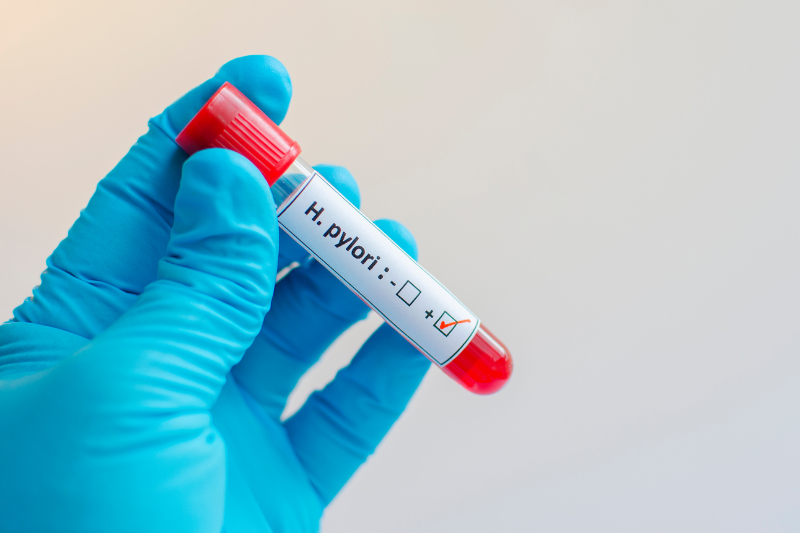If you’ve ever suffered from chronic acidity, bloating, or stomach ulcers, you may have heard of H. pylori. Short for Helicobacter pylori, this spiral-shaped bacterium is one of the most common infections worldwide—affecting nearly half the global population.
While not everyone with H. pylori develops symptoms, it can have a significant impact on gut health and long-term digestion. Let’s break down what H. pylori is, how it affects the gut, and what you can do about it.
What Is H. pylori?
Helicobacter pylori is a type of bacteria that lives in the stomach lining. Unlike most bacteria, it can survive in the harsh acidic environment of the stomach by producing an enzyme called urease, which neutralizes stomach acid around it.
Most people pick up H. pylori in childhood, and the infection can last for years—often without symptoms. However, in some individuals, it leads to inflammation, ulcers, and even long-term complications.
How H. pylori Affects the Gut?
1. Weakens the Stomach Lining
H. pylori damages the protective mucus layer of the stomach, making it more vulnerable to acid. This can cause gastritis (inflammation) and stomach pain.
2. Causes Peptic Ulcers
By irritating the stomach lining, H. pylori is the leading cause of peptic ulcers—painful sores in the stomach or small intestine.
3. Disrupts Digestion
Infected individuals often experience bloating, burping, nausea, and irregular digestion.
4. Alters the Gut Microbiome
H. pylori infection can shift the balance of gut bacteria, reducing beneficial microbes and increasing harmful ones.
5. Increases Risk of Complications
In rare cases, long-term H. pylori infection is linked with stomach cancer and lymphoma.
Common Symptoms of H. pylori Infection
Not everyone shows signs, but when symptoms do appear, they may include:
- Burning or aching pain in the stomach
- Frequent bloating and burping
- Loss of appetite
- Nausea or vomiting
- Unexplained weight loss
- Black or tarry stools (a sign of bleeding ulcers—requires urgent medical care)
How Is H. pylori Diagnosed?
Doctors may use:
- Breath test (measures urease activity)
- Stool antigen test
- Blood test for antibodies
- Endoscopy (in severe or unclear cases)
Conventional Treatment for H. pylori
Most often, doctors prescribe triple therapy or quadruple therapy: a combination of antibiotics and acid-reducing medications to eradicate the bacteria.
It’s important to complete the full course of treatment to prevent antibiotic resistance.
Natural Remedies & Gut-Supportive Practices
While antibiotics are the standard treatment, some natural approaches can support gut healing during and after treatment:
- Probiotics → Restore gut microbiome balance and reduce antibiotic side effects.
- Green tea & broccoli sprouts → Contain compounds shown to inhibit H. pylori growth.
- Honey (especially Manuka honey) → Has antibacterial properties.
- Garlic → Natural antimicrobial that may help suppress bacterial activity.
- Anti-inflammatory foods → Turmeric, ginger, and omega-3 rich foods soothe gut inflammation.
(Note: These should be used as supportive measures, not replacements for medical treatment.)
Protecting Gut Health After H. pylori
- Follow a gut-healing diet rich in whole foods, fiber, and probiotics.
- Limit irritants like alcohol, smoking, and ultra-processed foods.
- Manage stress—since it worsens gut inflammation.
- Stay consistent with follow-up tests if your doctor recommends them.
Final Thoughts
H. pylori is a common bacterial infection that often goes unnoticed but can significantly impact gut health. From causing gastritis and ulcers to disrupting the microbiome, its effects on the digestive system are far-reaching.
The good news? With proper diagnosis, treatment, and gut-supportive remedies, it’s possible to heal and restore balance to your digestive health.
If you’ve been struggling with chronic acidity, bloating, or stomach pain, don’t ignore it—testing for H. pylori might be the first step to healing your gut.


